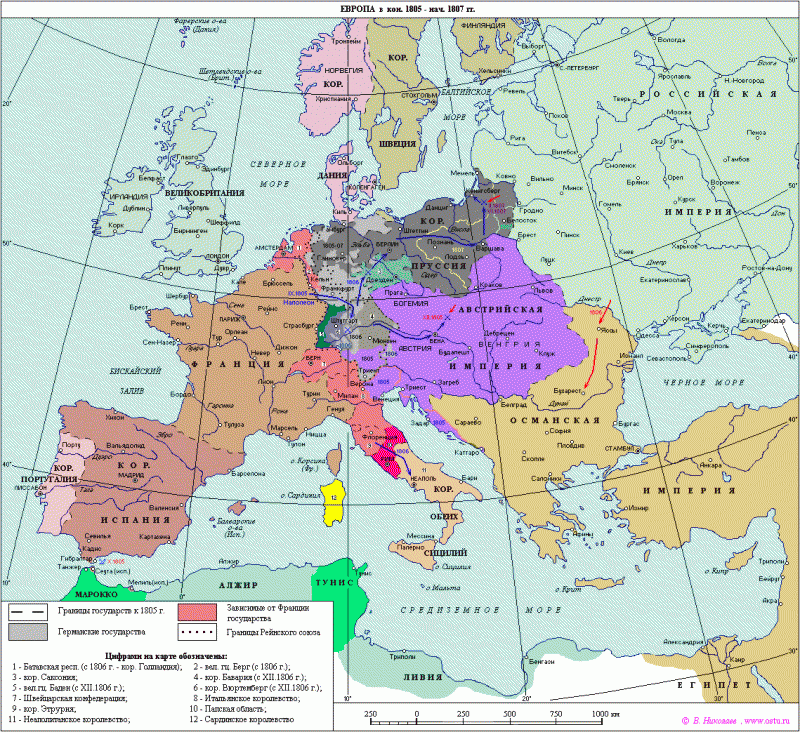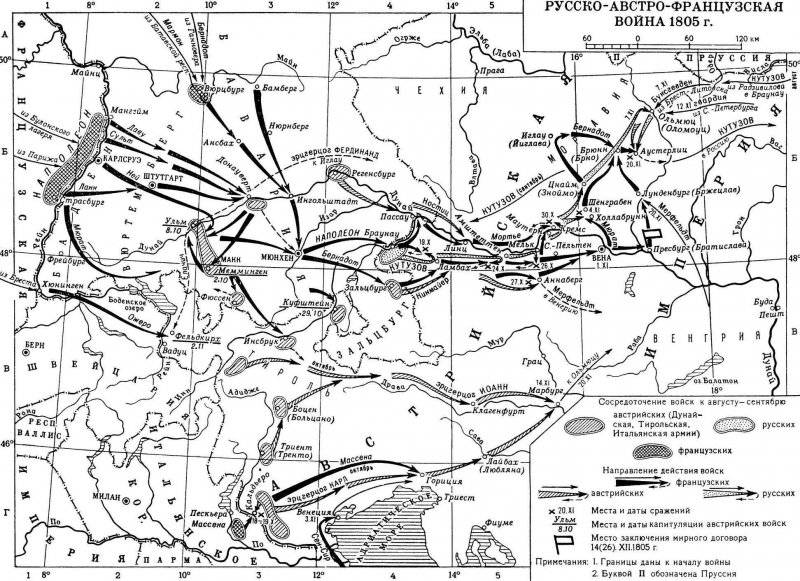Russia and III anti-French coalition
The basis of the Third Anti-French Coalition was the Russian-English Union Treaty signed by 11 (23) on April 1805 of the year. He was signed in St. Petersburg by the head of the Ministry of Foreign Affairs of Russia Prince A. Chartoryi and HH Novosiltsev (he traveled to England with the proposal of a union) and the British envoy Lord Gouyer.
Russia and Britain decided to create a coalition that exposes a half-million army. Russia pledged to set up 115 thousand army, then the number was increased to 180 thousand. The rest of the troops had to put Austria, the Kingdom of both Sicilies and other possible allies. The British pledged to support their alliance fleet and finances (paid for the war). So, London agreed to give 1 million 250 thousand pounds annually for every 100 thousand soldiers. In addition, London undertook to extend its obligations to Austria, Sweden, Denmark, Prussia if they also entered the war against France within a year. According to the treaty, the allies were going to seek the liberation of Hanover; restoration of independence of the Netherlands (Belgium was supposed to move to it) and Switzerland (it grew at the expense of Geneva and Savoy); restoration of the kingdom of Sardinia; complete purification from the French of Italy and gave guarantees of independence to the Kingdom of Naples; Austria was supposed to get Salzburg and Breisgau in southern Germany and lands north of the Po and Adda rivers in Italy. By a secret article, both great powers pledged to promote the restoration of the Bourbon dynasty on the throne of France, and the Orange Dynasty in the Netherlands.
Then the coalition included several more countries - Austria, Sweden, the Kingdom of Neapolitan and Portugal. This alliance was very unstable, since there were huge contradictions between the allies. It was believed that a victory over France would automatically lead to their resolution. These contradictions ultimately led to the collapse of the Third Coalition.
So, Petersburg and Vienna began to argue already during the development of a plan of military operations. The Austrian Gofkrygsrat - the court military council of the Austrian Empire - was going to solve the problems of Austria first of all - to strengthen its positions in South-West Germany and Northern Italy. As a result, the Austrian military forces were divided, most of them under the command of the most capable Austrian commander, Archduke Charles of Austria, was sent to Italy. Although when coordinating the actions of armies with Russia, it was decided that the main theater of military operations would be in Central Europe.
The outbreak of hostilities caused a change in the position of Prussia, which was going to remain neutral. Napoleon, hurrying to redeploy his troops to the aid of Bavaria, led them through the territories belonging to Prussia, which caused the wrath of Berlin. 3 November 1805, Russia and Prussia signed an agreement on joint action against France.
But this diplomatic success could no longer straighten the situation at the front. Napoleon at that time was preparing the landing army for landing in England in the north of France and, having received information about the actions of the coalition forces, with a rapid march made a throw to the south and in the shortest possible time reached Bavaria. Napoleon led the troops to Bavaria earlier than the Austrian 72-thousand army under the command of Baron Karl Mac von Leiberich. So the Austrians in their self-esteem did not wait for the arrival of the Russian troops: two armies marched to help Austria - under the command of Fyodor Buksgevden (30 thousand) and Mikhail Kutuzov (50 thousand).
The Austrian army 25-26 September was defeated by the French army at the river Iller and began to retreat. By October 16, Napoleon surrounded Baron Karl Mac von Leiberich's army near Ulm, she capitulated on October 20 - 30 thousand people were captured, about 20 thousand people managed to escape, another 12 thousand were killed and injured.
Russian troops were left alone with the superior French army. In addition, the independence of Kutuzov was limited to the instructions of Alexander, the plans of Austria, in whose hands was the supply of the Russian army. As a result, Napoleon intercepted the strategic initiative, he did not waste time and spoke out, intending to repeat the maneuver of the encirclement with the Russian army. At this time, Russian forces were on the Inn River in Braunau.
The commander of the Russian army, General Mikhail Kutuzov, decided to move away from Braunau to Lambach and Linz and go further to the east in order to join up with the army of F. Buxgevden and the Austrian forces of the Archdukes Charles and John. The withdrawal of the main forces of the Russian army covered 7 thousand rearguard under the command of General Peter Bagration, he gained great fame in this campaign. Between the rear parts of Bagration and the main forces was a separate detachment of Lieutenant-General M. A. Miloradovich, which was intended to reinforce the rearguard. When Napoleon joined Braunau on October 29, there were no Russians there. This march entered history world military art as a wonderful example of a strategic maneuver - in October-November, the army of Kutuzov 1805 made a retreat maneuver with a length of 425 km from Braunau to Olmutsu. At the same time, the Russian rearguard led successful battles - 19 (31) in October 1805, near Merzbach near the city of Linz, Russian troops successfully repulsed the attacks of French cavalry of Marshal Murat for five hours. Then there were fights on the Enns River (October 22), at the Monastery of St. Florian (October 23), at Amstetten (October 24), at the Melk Monastery (October 26), near St. Peltin (27). Bagration and Miloradovich did not allow themselves to be destroyed, restraining the onslaught of the superior forces of the enemy.
Kutuzov skillfully removed the troops from the blow, but the Austrian command ordered to defend the fortifications at Krems and defend Vienna, this order was confirmed by Alexander. Kutuzov believed that this idea was disastrous, since 8 thousand Corps Marttier had already moved to the left bank of the Danube to cut off the Russian army, and on the right bank they were pursued by Murat's corps. He continued his maneuver. Russian army crossed the Danube. October 30 (November 11) at the Battle of Krems, Kutuzov’s army completely destroyed the Martier corps (the French lost 5 thousand people killed and wounded and 1,6 prisoners).
1 (13) November the Austrians surrendered Vienna without resistance, the body of Murat passed the Danube. The Russian army was again threatened by encirclement. Kutuzov, rescuing the army, ordered 6-7 thousand Bagration's detachment to stop Murat's corps (from 30 to 55 thousand people). The Russian rearguard fought 42 kilometers north-west of Vienna and north of Schöngraben. Murat considered that this was the main army and concluded a truce. Napoleon, upon learning of this, ordered an immediate attack, realizing that the Russians had tricked Murat. All day 4 (16) November was a battle, the detachment of Bagration was surrounded, but was able to break through the French ring. Two days later, the remnants of his squad united with the main forces at Pogorlitz. Kutuzov slipped through the most dangerous section at Znaym and arrived at Brünn, and then at Olmutz, where the second Russian army and the remaining Austrian forces marched.
Thus, Kutuzov thwarted Napoleon’s plans to surround and destroy the Russian army. The Austro-Russian forces assembled from Olmutz, though not by much, surpassed the French army. In addition, from the north of Italy the army of Charles came into the rear of the French. It is necessary to take into account the fact that soon Prussia should have entered the war against 200 by the army, Berlin signed the union convention, but dragged out the time, negotiating with the Russian and British representatives.
Kutuzov offered to pull time, collect all the forces of the allies. It is even possible to retreat to Bohemia, further stretching the communications of the French army, narrowing the possibilities for the enemy command to deploy reinforcements. And only after that join the decisive battle and defeat his army. But the Austrian headquarters called for an immediate battle. Alexander supported the proposal of the Austrians, putting the fulfillment of the allied debt in the first place. 20 November (2 December) 1805 the famous battle of Austerlitz (“Battle of the Three Emperors”) took place. And then they did not heed the advice of Kutuzov - he suggested not starting complicated maneuvers (the Austrian headquarters wanted to cut off the French army from Vienna) and not go on the attack without knowing the location of the enemy. On this sad day, Kutuzov headed one of the columns that occupied the Pratzen heights in the center of the position of the Russian-French army (it contained 86 thousand people, and the French had 73 thousand). Alexander arrived at Kutuzov and ordered to attack, leaving the heights. As soon as the Russian troops came out, the French immediately went on the attack and seized the heights, Napoleon was in the hands of a key position, the center of the Russian-Austrian army was broken. After this, the battle was lost - Napoleon defeated the left wing of Buxhevenden, then hit the right flank of Bagration. The Russians desperately resisted, but were forced to retreat. Emperors Alexander and Franz fled from the battlefield before the end of the battle, Kutuzov was wounded and barely escaped captivity. The Russian-Austrian army lost up to 27 thousand people killed, wounded and captured, and most of the 21 thousand - Russian.
Ulm-Olmütz march maneuver of the Russian army 25 October - 22 November 1805 of the year.
Results
- Alexander laid all responsibility for the defeat on Kutuzov, he was sent to the "honorary exile" - the Kiev military governor
- Efforts to engage Prussia in the war were in vain. On December 15, the Franco-Prussian treaty was signed in Vienna, according to which Paris and Berlin guaranteed each other’s current possessions and future territorial acquisitions. In Russia, the contract learned only in February 1806.
- Austria left the coalition and 26 December 1805 of the year signed a peace treaty with France in Pressburg, becoming its ally. The Austrians feared that Prussia, having mobilized an 200 thousand army, would join France and put all Germany under its control. In Italy, the Austrians gave way to Napoleon, as the Italian king, the Venetian region, Istria (except Trieste) and Dalmatia, and recognized all the early French conquests. The Austrians of Bavaria ceded the Tirol, the right bank of the Inna, Burgau and Lindau, as well as Passau and Ayhshtet, taken from the Salzburg Elector. Austrian possessions in Swabia transferred to the principality of Württemberg. Baden received Konstanz, as well as the land of the Duchy of Breisgau. Emperor Franz II was forced to recognize the titles of kings for the monarchs of Bavaria and Württemberg. All this led to the fact that in 1806, the Holy Roman Empire was dissolved. In addition, Vienna paid a contribution to Paris in the amount of 40 million florins.
- Russia did not officially come out of the war, but the coalition fell apart. Thus, the continental part of the kingdom of Naples, including Naples itself, was captured by Napoleon. In this area the French emperor formed a satellite state. Petersburg began to try to create a new anti-French alliance. The course of confrontation with France was continued.


Information